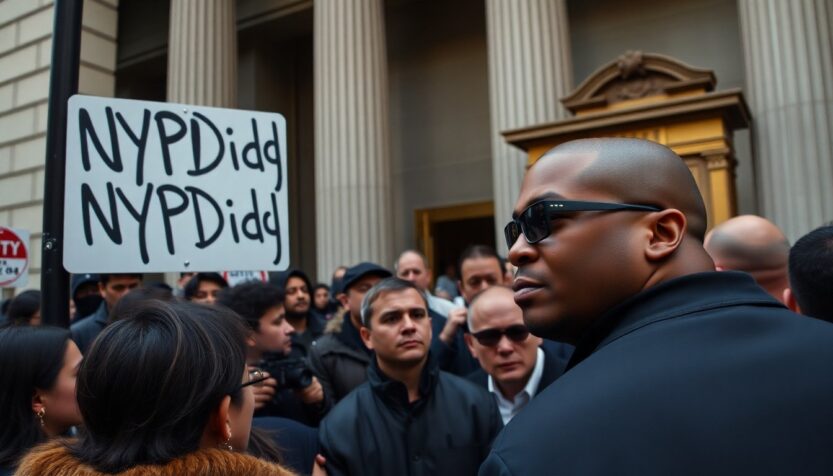Outside the courthouse, the unmistakable sounds of an early Bad Boys Records track resonated from a boom box, creating a surreal backdrop for the day’s proceedings. Onlookers had defaced a Manhattan traffic sign with the provocative tag “NYPDiddy,” reflecting the public’s fascination with Sean “Diddy” Combs as he faced sentencing for charges related to prostitution. Nearly two years had passed since the initial allegations of sexual and physical abuse against him, igniting a national conversation about accountability and misconduct in the music industry.
As Combs prepared to receive his sentence for two violations of the Mann Act, which prohibits the transportation of individuals for illicit purposes across state lines, the atmosphere was electric. Despite the gravity of the situation, this moment marked a crescendo in a saga that had attracted considerable media attention, culminating in a trial that many had anticipated would reveal scandalous secrets about the rich and famous.
The trial’s impact on hip-hop culture
The courtroom buzz reached a fever pitch, with a crowd that rivaled the initial opening statements back in May. For many observers, particularly those chronicling hip-hop culture, the trial represented a mixed bag. With Diddy’s illustrious career characterized by extravagant events like the infamous Hamptons White Parties, the charges of sex trafficking and racketeering initially promised an intriguing glimpse into the darker side of celebrity. However, the trial largely revolved around testimonies from two pivotal figures: Casandra “Cassie” Ventura, Diddy’s former girlfriend, and an unnamed witness.
Both women delivered harrowing accounts detailing a history of abuse, addiction, and elaborate sexual escapades orchestrated by Combs, which had become colloquially known as “freak-offs.” Armon Wiggins, a YouTube influencer who traveled from Los Angeles to cover the trial, expressed his disappointment, stating, “I thought this case would be more explosive.” Wiggins had previously reported on the Tory Lanez trial and felt this was a significant moment for hip-hop, similar to the cultural impact of the O.J. Simpson trial.
Media frenzy outside the courtroom
Outside the Daniel Patrick Moynihan Courthouse, independent media personalities set up their equipment, livestreaming the day’s events on social media. Wiggins gained notoriety for his antics, particularly after the verdict was announced, when he playfully poured baby oil on himself—an item frequently mentioned during the trial. This act quickly circulated through traditional media channels, although Wiggins later apologized for the stunt on Instagram.
As the trial progressed, it became clear that the jury’s perception of the case diverged from public and media expectations. “It was mostly about his unusual sexual lifestyle,” Wiggins noted, indicating that as the trial unfolded, many began to dismiss the seriousness of the allegations, reflecting a troubling trend in public discourse.
Sentencing and reactions
Despite being acquitted of the most severe charges in July, which could have resulted in a life sentence, Combs still faced substantial consequences. After weeks of deliberation, Judge Arun Subramanian, a Biden appointee, ultimately sentenced him to just over four years in prison. Prosecutors had sought a lengthier sentence of more than 11 years, while his defense argued for immediate release, citing time served from his previous incarceration.
In the courtroom, Combs, clad in a white sweater that hinted at his current circumstances, took a moment to greet his family and embrace his legal team. When it was his turn to address the judge, he delivered his most substantial comments on the case. In a heartfelt apology, Combs expressed remorse to Ventura and the anonymous witness, acknowledging that his actions had caused them distress. “I brought you into my mess,” he confessed, calling his behavior “disgusting, shameful, and sick.”
Contrasting perspectives from supporters
In the lead-up to sentencing, various character references were submitted to the court, revealing contrasting views of Combs. Yung Miami, a rapper and recent girlfriend, highlighted the positive impact he had on the Black community, recalling significant moments like attending the Met Gala. In stark contrast, Deonte Nash, a former stylist for Combs, provided a more critical perspective, emphasizing how many had suffered under Combs’s influence to protect his reputation.
As the trial reached its conclusion, Ventura’s absence in the courtroom was notable. In her submitted letter to the judge, she reflected on her journey through the legal process. She expressed a deep sense of disillusionment, stating, “I have learned that victims and survivors will never be safe.” Her fear of retribution had prompted her to relocate her family, underscoring the profound impact this case had on her life.
As Combs prepared to receive his sentence for two violations of the Mann Act, which prohibits the transportation of individuals for illicit purposes across state lines, the atmosphere was electric. Despite the gravity of the situation, this moment marked a crescendo in a saga that had attracted considerable media attention, culminating in a trial that many had anticipated would reveal scandalous secrets about the rich and famous.0

